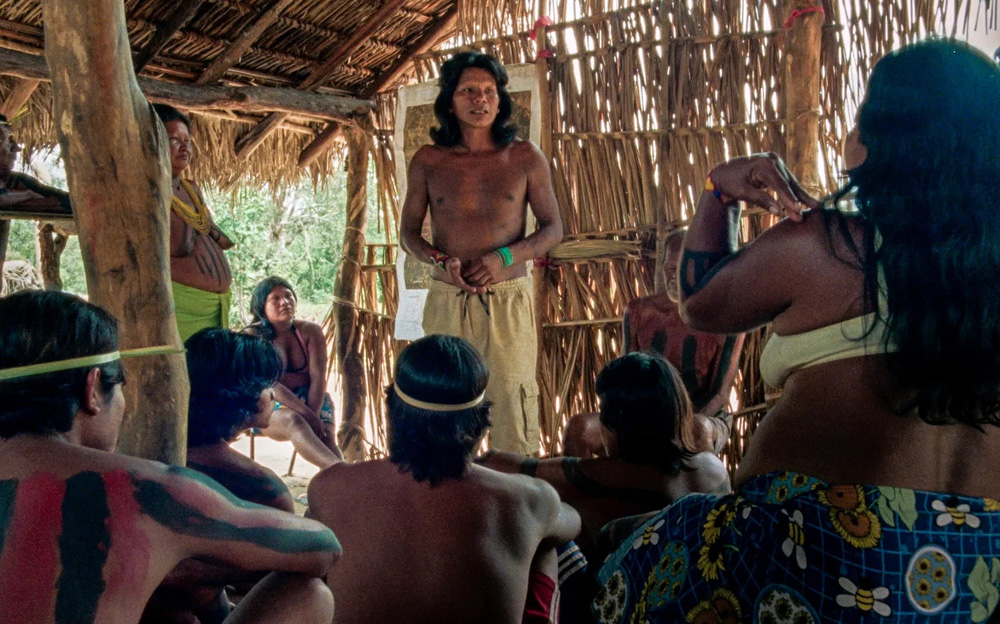History flows like a river in “Crowra (The Buriti Flower),” taking place along the Balsas tributary in northeastern Brazil where the indigenous Krahô have lived off the land for centuries. Directors Renée Nader Messora and João Salaviza previously embedded in the community for their 2018 drama “The Dead and the Others,” and after observing a young man being asked to summon the spirit of his late father, the duo have stirred up the past as it continues to shape the present and future in their latest film where the Krahô are under the existential threat of both individual thieves, known as cupe who are encroaching on their protected land to steal the macaws that can still find safety in the trees, and the increasing deregulation pushed by the Bolsonaro government, allowing for not only stray trespassers to ravage the forest, but far greater entities that could profit from mass deforestation.
While now is a time of crisis, it isn’t presented as anything new in “Crowra,” which impressively spans generations without leaving the perspective of two characters – Patpro (Ilda Patpro Krahô) and her uncle Hyjnõ (Francisco Hyjnõ Krahô), who carry on the legacy of their family and by extension, the entire Krahô community and are all too aware that their survival depends on sharing the stories that have been passed down to them. At first, there may seem to be a generational divide when Patpro’s daughter Jotàt (Solane Tehtikwyj Krahô) complains of no longer being able to sleep at night, believing she needs a mattress to properly rest, which isn’t the type of thing you’d usually find in the village where they live, but among the relatives such as Debbie (Debora Sodre) that have moved out to more urban environments. Debbie jokes with Patpro, “She really is sick,” knowing the cost of a mattress when money isn’t really a currency among the Krahô, but the concerned mother believes her uncle may be able to get to the bottom of Jotàt’s insomnia, believing it could be a spiritual unease.
Hyjnõ has had his own share of sleepless nights, awaiting the birth of a son and wondering what world he’s about to bring this baby boy into when he is looked to as a leader among the Krahô in their ongoing defense of their land, and “Crowra” gracefully segues from Patpro looking after her daughter to Hyjnõ engaging all the Krahô youth in lessons about their past as the descendant of one of the two survivors of a devastating massacre that occurred during the last major concerted threat against them as ranchers sought to repopulate the area with their cattle. It’s telling that in the rare confrontation that actually happens on screen in “Crowra,” one only catches a seconds-long glimpse of a random motorcycle-riding cupe that demands to be let onto Krahô land, but the scene is largely given over to a woman disgusted with their temerity and throughout the film, the seemingly unmediated opportunity to listen to the Krahô highlights the consequences of colonization that an outsider might never think about otherwise when, for instance, Hyjnõ explains at the long-running Ketuwaje Feast that it wasn’t the ranchers so much as their cattle that could destroy the community by imperiling the cassava and bean crops with their feeding habits, and one is able to see the pull the outside world has on a younger generation of Krahô while elders may look naive to them for not embracing technology and other modernities yet it’s clear their longevity has been a result of their resistance to it.
In spite of a few naked moments of exposition such as Patpro watching a leader from the indigenous community outline environmental impact issues at a global forum on an iPhone and her daughter reading aloud the 1969 agreement that led to the establishment of FUNAI, the government group aimed at protecting indigenous people, “Crowra” avoids being didactic even as it comes across as a primal scream for survival, with the clear nonfiction underpinnings of the production smoothing out any rough narrative edges. It would make a good double feature with Alex Fritz’s recent doc “The Territory” that centered the Uru-eu-wau-wau in their fight against the farmers looking to overtake them, but whereas that film took the form of a thriller to communicate its urgency, “Crowra” more gradually lets one into the rituals of the Krahô to see their beauty, making a potential loss of the culture unfathomable. Thankfully, Messora and Salaviza haven’t only captured the moment at hand, but suggest a future as much as a past.
“Crowra (The Buriti Flower)” will screen at the Cannes Film Festival as part of Un Certain Regard on May 24th at 10:45 am at Cineum Imax, 11:15 am at Licorne and 4:15 pm at the Bazin, and May 25th at 9 am at the Cinema Aurore.




